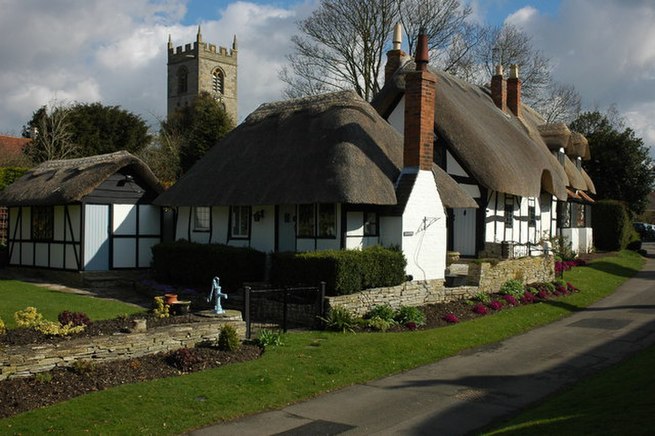
Main Difference
The main difference between Cottage and Bungalow is that the Cottage is a typically, a small house and Bungalow is a type of building, originally developed in the Bengal region in South Asia, but now found throughout the world.
-
Cottage
A cottage is, typically, a small house. It may carry the connotation of being an old or old-fashioned building. In modern usage, a cottage is usually a modest, often cosy dwelling, typically in a rural or semi-rural location.
The word comes from the architecture of England, where it originally referred to a house with ground floor living space and an upper floor of one or more bedrooms fitting under the eaves. In British English the term now denotes a small dwelling of traditional build, although it can also be applied to modern construction designed to resemble traditional houses (“mock cottages”). Cottages may be detached houses, or terraced, such as those built to house workers in mining villages. The tied accommodation provided to farm workers was usually a cottage, see cottage garden. Peasant farmers were once known as cotters.
The holiday cottage exists in many cultures under different names. In American English, “cottage” is one term for such holiday homes, although they may also be called a “cabin”, “chalet”, or even “camp”. In certain countries (e.g. Scandinavia, Baltics, and Russia) the term “cottage” has local synonyms: In Finnish mökki, in Estonian suvila, in Swedish stuga, in Norwegian hytte (from the German word Hütte), in Slovak chalupa, in Russian дача (dacha, which can refer to a vacation/summer home, often located near a body of water).
There are cottage-style dwellings in American cities that were built primarily for the purpose of housing slaves
In places such as Canada, “cottage” carries no connotations of size (compare with vicarage or hermitage).
-
Bungalow
A bungalow is a type of building, originally developed in the Bengal region in South Asia. The meaning of the word bungalow varies internationally. Common features of many bungalows include verandas and being low-rise. In Australia, the California bungalow associated with the United States was popular after the First World War. In North America and the United Kingdom, a bungalow today is a house, normally detached, that may contain a small loft. It is either single-story or has a second story built into a sloping roof, usually with dormer windows (one-and-a-half stories).
-
Cottage (noun)
A small house; a cot; a hut.
-
Cottage (noun)
A seasonal home of any size or stature. A recreational home or a home in a remote location.
“Most cottages in the area were larger and more elaborate than my home.”
-
Cottage (noun)
A public lavatory
-
Cottage (verb)
To stay at a seasonal home, to go cottaging.
-
Cottage (verb)
To have homosexual sex in a public lavatory; to practice cottaging.
-
Bungalow (noun)
A small house or cottage usually having a single story
-
Bungalow (noun)
A thatched or tiled one-story house in India surrounded by a wide verandah
-
Cottage (noun)
a small house, typically one in the country
“a holiday cottage”
-
Cottage (noun)
a simple house forming part of a farm, used by a worker
“farm cottages”
-
Cottage (noun)
(in the context of casual homosexual encounters) a public toilet.
-
Cottage (verb)
perform homosexual acts in a public toilet
“I was busted for cottaging”
-
Bungalow (noun)
a low house having only one storey or, in some cases, upper rooms set in the roof, typically with dormer windows.
-
Bungalow (noun)
(in SE Asia) a large detached house with more than one storey.
